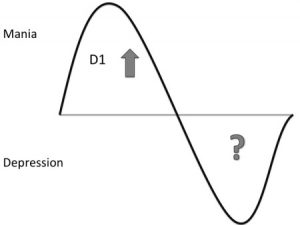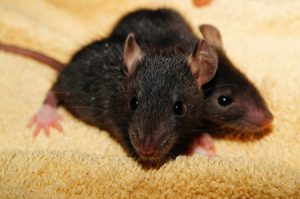What we do
Psychiatric disorders are often caused by an interaction between genetic factors and environmental influences. The aim of our research is, to model these parameters for example through enriched environment, stress during development, pharmacological manipulation or with the use of lentiviral vectors. The so gained animal models, for example for bipolar disorder, depression, ADHD and addiction disorders, can be used to examine behavioral changes, involved brain areas and to potentially develop new therapeutic strategies.
 At the moment we are focussing on the development of a lentivirally induced animal model for bipolar disorders. After we were able to induce mania- and depressive-like behavior with just one manipulation, namely an over-expression of the prefrontal dopamine D1 receptor, we are now interested in the thereby effected secondary mechanisms. With the use of mass spectrometry, quantitative real-time PCR and positron emission tomography (PET) we are analyzing mood-related pathways in the brains of our rat model.
At the moment we are focussing on the development of a lentivirally induced animal model for bipolar disorders. After we were able to induce mania- and depressive-like behavior with just one manipulation, namely an over-expression of the prefrontal dopamine D1 receptor, we are now interested in the thereby effected secondary mechanisms. With the use of mass spectrometry, quantitative real-time PCR and positron emission tomography (PET) we are analyzing mood-related pathways in the brains of our rat model.

Furthermore we are investigating epigenetic and neurobiological changes in the brain after exposure to adverse early life events, like maternal separation, potentially leading to the onset of depression. To look at different levels, we are analyzing the methylation state of the DNA, examining the gene expression on RNA levels with qPCR and protein expression with ELISA and immunohistochemistry. We furthermore characterize the animals’ behavior with different mood tests. We then analyze the impact of the identified genes on predisposing the brain for the development of major depressive disorder as a result of adverse early life events.
In one of our other projects we try to mimic depression or as we say “depressive-like behavior” by an inflammatory response in animal models. We are using different techniques to determine changes in blood or in the brain; i. e. High Performance Liquid Chromatography (HPLC) for a possibly existing neurotransmitter imbalance in the hippocampus, frontal cortex and other brain regions, Fluorescence-Activated Cell Sorting (FACS) analysis to detect inflammation-associated markers in microglial cells/cytokine changes in blood or simply immunohistochemical staining to study specific proteins in brain tissue.
We are sponsored by: Mercator Research Centre Ruhr (MERCUR), Deutsche Forschungsgemeinsschaft (DFG), Studienstiftung des Deutschen Volkes
Our Expertise
Behavioral Tests Since we are analyzing the underlying mechanisms of psychiatric disorders, we have a large battery of behavioral testing setups for mouse and rat. Each test is specific for certain behavior that we use to observe behavioral changes. Besides the big selection of tests, our lab also offers qualified expertise in all of these […]